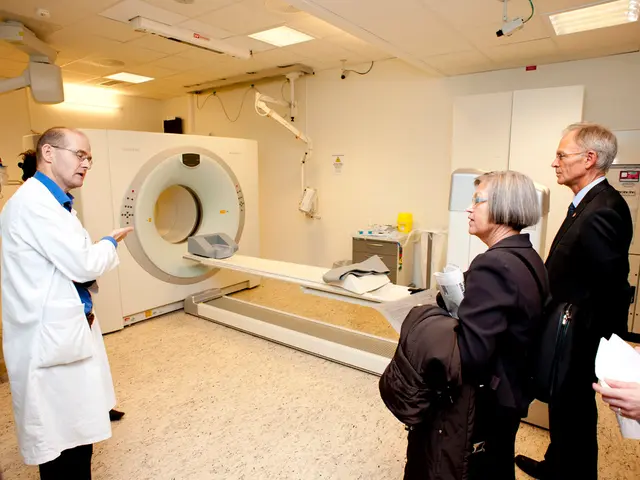Hanging Out with MRSA: A Perspective
MRSA colonization: Spread, stopping, and further insights
Chillin' with MRSA ( methicillin-resistant Staphylococcus aureus) means the bacteria have set up camp on or inside your body, without causing any obvious issues. That's right, you can carry MRSA without showing symptoms of an infection!
Hey, it's just like having party guests at your place, some just hanging around, not causing any fuss - yet. MRSA can be a pain in the neck for healthcare professionals, though. Here's why: people carrying MRSA can unknowingly pass it on to others, especially in hospital settings, potentially causing infections.
MRSA is a big deal because it's a tough cookie when it comes to common antibiotics like methicillin, penicillin, amoxicillin, and oxacillin. This resistance makes it tricky to treat and potentially more dangerous for vulnerable individuals.
Now, how does MRSA spread? Simple: close contact, shared equipment, and environmental contamination. Sounds like a college dorm room, right?
Colonization sometimes leads to infection, especially when the immune system takes a dive or there's a wound in the picture. So remember, keeping clean and following hygiene guidelines helps keep MRSA at bay.
- Regular washing and showers with antiseptic soap
- Keep cuts and wounds covered and clean
- Avoid sharing personal items like towels, razors, clothing, and bedding
- Wash clothes, sheets, and towels in hot water and dry on high heat
- Disinfect surfaces regularly
In healthcare settings, medical professionals might screen people for MRSA, especially those about to undergo surgery. They'll swab common infection spots, like the nose and skin folds. If they find MRSA, they might prescribe a nasal cream, body wash, or shampoo for a few days to reduce the bacteria load.
But how do you know if you've got an MRSA infection? Red flags include pain, redness, pus, swelling, and heat in affected areas. So keep an eye out!
By sticking to good hygiene practices both at home and in medical settings, you can help keep MRSA at arm's length.
FAQ
- Does MRSA go away on its own? Sometimes, mild infections may resolve on their own, but severe cases usually require treatment.
- Does chlorine kill MRSA? Yes, chlorine can help inactivate MRSA, especially at higher concentrations and extended contact times.
- Will I always carry MRSA bacteria? If you've had MRSA, there's a chance you could carry it without symptoms, but proper hygiene and treatment can help reduce this risk.
[1] American Society for Microbiology. (2017). Managing MRSA Infections. Retrieved from https://www.msrawareness.org/managing-methicillin-resistant-staph-mrsa-infections/
[2] Centers for Disease Control and Prevention. (2020). MRSA Infections. Retrieved from https://www.cdc.gov/mrsa/index.html
[3] Infectious Diseases Society of America. (2021). MRSA Infections Overview and Treatment. Retrieved from https://www.idsociety.org/practice-guidelines/mrsa-infections-overview-and-treatment/
- Medical-conditions like chronic diseases and skin-conditions, such as cancer, respiratory conditions, digestive-health issues, eye-health problems, and neurological disorders, require appropriate care and management.
- Maintaining overall health-and-wellness, including fitness-and-exercise, nutrient-rich nutrition, and skin-care, can bolster the immune system and help prevent autoimmune-disorders.
- Therapies-and-treatments, including cognitive behavioral therapy for mental-health, hearing aids for hearing impairments, and cardiovascular health treatments, are essential for managing various health challenges.
- Science plays a crucial role in identifying new avenues for treating resistant bacteria like superbugs, and developing innovative therapies to combat and prevent infectious diseases, such as MRSA.
- While the science community grapples with the challenges posed by superbugs, it's crucial for individuals to follow hygiene guidelines to minimize the risk of spreading such bacteria in their communities.
- That said, adhering to hygiene practices doesn't just protect against MRSA; it also battles the spread of general infections and promotes better health and wellness.
- When it comes to MRSA, it's important to remember that while some cases may resolve on their own, severe infections often require treatment, and chlorine can help inactivate the bacteria.
- Additionally, even if you've had MRSA, proper hygiene and treatment can significantly reduce the risk of carrying the bacteria long-term.
- For more information on MRSA management, refer to reputable sources like the American Society for Microbiology, the Centers for Disease Control and Prevention, and the Infectious Diseases Society of America.
- Educating yourself about MRSA and implementing necessary precautions can help you make informed decisions and lead a healthier lifestyle.








